In This Episode << SLIDE LEFT TO SEE ADDITIONAL SEGMENTS
Faith and Family in America, Part Four: Religious Responses
BOB ABERNETHY, anchor: Now, the last in our series on Faith and Family in America. Today, how churches and other religious groups are responding to the growing number of families who are not the traditional married mother and father with children — single mothers, cohabiting men and women, gay couples, and the divorced.
Judy Valente begins her report with conservative Protestant evangelicals trying to preserve traditional marriage.
TONY PERKINS (President, Family Research Council) (Speaking at Event): We’ve got to take a stand, even if it means people say bad things about you.
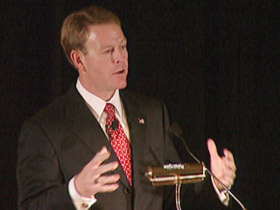
JUDY VALENTE: Tony Perkins is champing at the bit. The president of the Family Research Council told a California audience he is looking forward to the Supreme Court confirmation hearings for Judge Samuel Alito. Perkins believes Alito will not be the kind of high court judge who tries to redefine marriage, but one who will uphold traditional religious values.
Mr. PERKINS (Speaking at Event): This nation will only be as strong as its families, and the families will only be as strong as the parents and marriages that bind them together.
VALENTE: Earlier this month, Texas became the 19th state to pass an amendment defining marriage as between a man and a woman.
Mr. PERKINS: In every state where a marriage amendment has made its way to the ballot it has passed, on average with over 70 percent of the support of the voters.
VALENTE: These votes, he says, will put pressure on Congress to pass a similar amendment to the U.S. Constitution.
Mike and Harriet McManus started Marriage Savers nearly 10 years ago. They say their program has saved 50,000 marriages that would have ended in divorce.
MIKE MCMANUS (Co-founder, Marriage Savers): You are declaring, by your actions here, a new day for marriage and an old day for divorce.
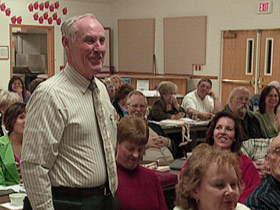
VALENTE: McManus says churches need to stop being wedding factories and start working to preserve marriages. Marriage Savers appears to have made an impact. Earlier this month, Cheyenne, Wyoming became the 198th city in which his “Community Marriage Policy” has been adopted. Clergy from different denominations signed the policy, agreeing to require four months of preparation for couples wanting to marry in their churches. The plan also provides support for troubled marriages.
Mr. MCMANUS: We think that there are couples in every church who could be trained to be mentors — to help people either prepare for marriage, to enrich existing ones, or save troubled ones. And this is really a new idea.
Pastor JERRY DYCE: I’m Pastor Jerry Dyce; my wife Opal, from Cheyenne Christian Center.
VALENTE: Those who volunteer to be mentors get a weekend of training before they begin to counsel other couples.
UNIDENTIFIED WOMAN #1: I came because I love children, and having been a teacher for many, many years, and watching the pain that children go through from a divorce — they don’t adjust well.
HARRIET MCMANUS (Co-founder, Marriage Savers): They’re sitting on a great mother lode of wisdom, a wealth of experience, some of it not so pleasant, but hopefully some of that experience has helped them to hone and fashion a more successful, more healthy marriage over the years.
VALENTE: Pam and Chad, who live together in Chicago, are about to take a premarriage inventory. She is Methodist. He is Catholic. And they want to get married in the Catholic Church. Each has filled out a lengthy questionnaire which includes specific questions for interfaith couples and for cohabiting couples. Now they will compare notes with a facilitator from the Archdiocese of Chicago.
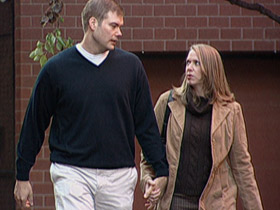
EILEEN SMITH (Facilitator, Archdiocese of Chicago): Rather than marry and then over time have some of these items come to the surface — both strengths and challenges — take a look at it ahead of time and be able to communicate about it. Are we ready to plunge in?
PAM: I think so.
Ms. SMITH: Okay.
ELSIE RADTKE (Director of Family Ministries, Archdiocese of Chicago): Many of the young couples getting married today come from families of divorce, and they do not want to go though the pain of divorce. So their rational is, “If we live together it’s like test-driving the car. If we live together, then we’ll see how that is.” Of course, what they don’t know is what research is showing us, and that is that about 70 percent of the couples that do cohabit will end up divorced. You cannot test-drive commitment.
VALENTE: Pam and Chad, both from stable, intact families, are confident about their relationship.
PAM (To Ms. Smith): We have mutual respect for each other that I think we’ll always have. I think that’s kind of what makes a marriage work.
CHAD (To Ms. Smith): We seem to do everything together and we work together really well.
VALENTE: Without a camera in the room, Pam and Chad would go on to discuss more delicate issues, including their different faiths and their approaches to child rearing. In the end, the couple said they were pleased with the experience.
CHAD: I think we learned that we already have a strong communication base between the two of us and that, I think, we’re going to be in really good shape.
PAM: Yeah.
VALENTE: The counseling doesn’t always go so well. Sometimes couples discover the relationship wasn’t as good as they thought.
Ms. RADTKE: One of the ladies in our office that does the facilitation calls herself now the “marriage buster” because she has found that about 20 to 23 percent of the couples that she has worked with — and she’s worked with hundreds of couples — end up either postponing their plans to marry or canceling them completely.
VALENTE: For religious institutions, preserving traditional marriage is one aspect of supporting family life. Another is how to support couples who are not married.
Even in some conservative faith traditions, cohabitating couples, single moms, gay couples, and stepfamilies are not uncommon in their congregations. Some churches have been slow to address these changes in family life and now find themselves in a dilemma: how to pass on their traditional religious teachings while still reaching out to nontraditional families.
Sociologist Penny Edgell of the University of Minnesota has studied church outreach to couples and families. She found a lot of nostalgia for the traditional family.
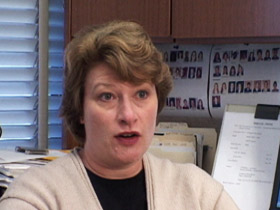
Professor PENNY EDGELL (Sociologist, University of Minnesota): But I also found that there were a lot of congregations where there was really quite a bit of innovation. There was a lot of talk about how we make dual family earners fit. There was a lot of talk about ministry to single parents and the divorced.
Pastor GENE APPEL (Willow Creek Community Church): There’s not a person in this room that doesn’t need a family — some kind of place to belong, to be loved, to have mercy extended to you there. Let’s pray together.
VALENTE: Willow Creek Community Church in suburban Chicago is one of the best-known of the megachurches. There are gay couples and cohabiting couples in the congregation. They are welcome, but there are no specific ministries for them.
Pastor RANDY FRAZEE (First Evangelical Free Church, Chicago): There is certainly a desire for churches to maintain and promote a concept of family that is extremely intact. And yet, again, I think we also have to deal with the reality that there is an enormous pandemic — there’s a crisis that’s going on, and we’re called on to reach out to help people right where they’re at.
VALENTE: In contrast to Willow Creek, the First Evangelical Free Church is a much smaller, more intimate congregation on the north side of Chicago. On a recent Sunday, a dramatic presentation on premarital sex, the challenges of marriage, and the issue of homosexuality.
UNIDENTIFIED MAN #1: Lord, I’m burning. Lord, I’m burning. Find some nice lady to put me out.
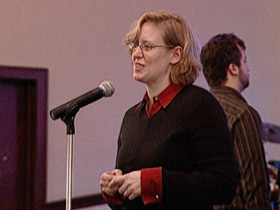
UNIDENTIFIED WOMAN #2: Sometimes it’s so easy for we happily married couples. We wag our fingers and shake our fingers at those who didn’t make it, feeling all superior. As if we don’t all have our own troubles and secrets.
VALENTE: The congregants have developed a real sense of community, lingering long after the service is over. In addition, small groups meet on a regular basis in private homes. Some have become like small families. It is a place for people to share their burdens.
UNIDENTIFIED WOMAN #3: I had a huge fight with my father yesterday.
JENNIFER: As you know, I wasn’t here last week because I was crying.
UNIDENTIFIED WOMAN #4: There was a death in our family.
Pastor BILL SHEREOS (First Evangelical Free Church, Chicago): We can’t replace family, but we can provide supportive environments where we do treat one another like families. And we don’t have many particular groups that are targeted toward individual kinds of people or kinds of families, but we do a lot of mixtures.
JENNIFER: We were joking at dinner that there really is no functional family. There’s no family that’s normal.
MARY: Being part of a small group, you get different feedback and different ideas about things because we’re related to each other through Christ, but not necessarily through blood or marriage.
Prof. EDGELL: I make a distinction between what I call radical innovation, which is really reconceiving what a family is, and incremental innovation, which is keeping your idea of what a family is, but doing whatever you can in terms of practical changes in ministry to reach out to more people.
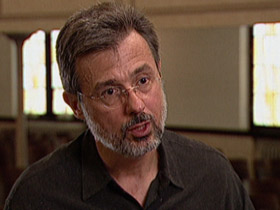
Pastor SHEREOS: There are two cultures I think that you have to bridge. And one is the culture of the Bible and the other is the culture in which you live. And to me, the church has to be a bridge between those two cultures,
VALENTE: Divorce is one area where churches do seem to be creating a bridge. St. Peter’s Catholic Church in the heart of Chicago’s business district is a place where people come and go throughout the day to say a quick prayer or just sit quietly. It also has an active outreach to divorced people.
CARYN WIECZORKIEWICZ (Facilitator, St. Peter’s Church): Most of them seem to come to the church because of divorce. They start coming more often to the services here, daily Mass, or stopping in to say a few prayers because it’s a time of struggle and there’s nowhere else to turn. Nonjudgmental friendship; seeing other people who are struggling as they are, who have the same faith background, who’ve all come from a background where they truly believed as they stood at the altar, “‘Til death do us part” — and now that’s all changed.
UNIDENTIFIED MAN #2: For a lot of us growing up Catholic, Mom and Dad, the worst thing I could think of was losing my parents — never divorce.
UNIDENTIFIED WOMAN #5: It was scary. What would happen to my faith, and how it would be accepted in the Church afterwards? It’s helped, talking it through with other people.
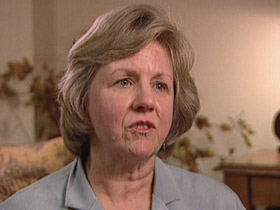
Ms. WIECZORKIEWICZ: There’s really two sets of people. There are people who come to Mass regularly, or who stop in at church when they’re going through a struggle — whether it be divorce or illness or whatever — and turn to church. Then there are others who are afraid to ask, they’re afraid to find out. They’re afraid of rejection. They’re trying to do it on their own. And that’s when they end up falling away.
VALENTE: Many churches struggle with ministry to unmarried couples.
Pastor SHEREOS: We have couples in our church that live together. And, you know, we don’t want to chase them out of the church. We want to minister to them in the name of Jesus. They would not end up being a leader in the church, but we would want them as part of the community.
VALENTE: Another issue is the status of gays, who make up a significant part of this Chicago neighborhood.
Pastor SHEREOS: We have some people in our congregation that would have same-sex attraction; some that would be gay couples. But our church wouldn’t give the message that that is a biblically endorsed lifestyle. We would recognize that it’s part of the broken world we live in.
VALENTE: Within the Catholic Church, ministry geared to gays is limited. In Chicago, at one church, one night a week, there is a Mass for A.G.L.O, the Archdiocesan Gay and Lesbian Outreach. It keeps a low profile. The priest did not want a camera at the Mass.
Elsie Radtke, of the Archdiocesan Family Ministries office, sees some signs of change.
Ms. RADTKE: I can’t speak for the Church. But I can speak for local parishes, and I have seen on the local level some very, very good pastoral outreach to couples and individuals who are homosexual. And they are treated with respect. They are invited to be part of the community.
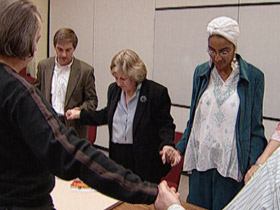
Pastor FRAZEE: It’s easy for us to tell people what we’re against. It’s another thing — it takes up more energy and time to come alongside people where they’re at and show them grace. And the thing that the evangelical church, by and large, believes is that all of us fall short of the perfection of God. A church can, with great conviction and compassion, maintain a position of what we believe the Bible teaches about what is good, what is right, what is healthy, but at the same time reach out to people where they are in their time of need.
Prof. EDGELL: One of the things we have to be careful of is thinking about religious congregations, religious leaders, religious doctrine as somehow set in stone and that that’s what’s authentic religiously. Because whether religious communities acknowledge it or not, authentic expressions of faith are ones that are relevant for contemporary society.
VALENTE: Edgell predicts that the most successful churches of the future will be those, like St. Peter’s in downtown Chicago, that recognize the new realities of family life and respond compassionately to the members’ changing lifestyles.
For RELIGION & ETHICS NEWSWEEKLY this is Judy Valente in Chicago.
ABERNETHY: And this footnote: in our RELIGION & ETHICS NEWSWEEKLY survey, about three quarters of nontraditional families and more than half of traditional families said love is what makes a family, and it doesn’t matter if people are gay, straight, married, or single.

